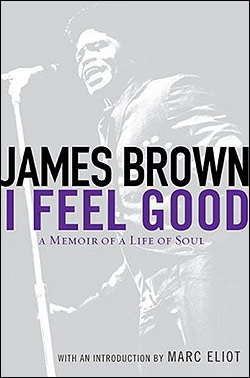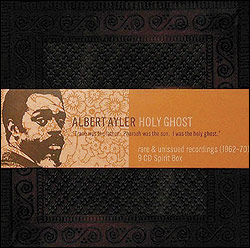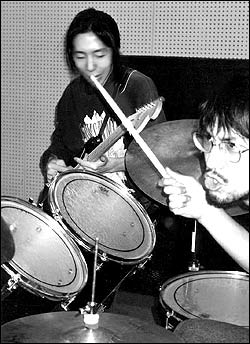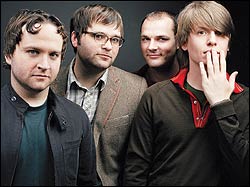The first peculiar thing about James Brown’s new memoir, I Feel Good: A Memoir of a Life of Soul (New American Library, $24.95), is that it’s a new memoir by him. It’s not that his life hasn’t been fascinating, because it has. But he already published his autobiography back in 1986. It’s called The Godfather of Soul, it was written with Bruce Tucker, and it’s wonderful—insightful and entertaining, a peek into the racing mind of one of the greatest musicians of the past century, with a tone that captures Brown’s let-me-tell-you-something attitude and brilliant, loopy way with language. In the last 19 years, Brown’s had a small handful of semihits, a live show that’s become permanently frozen in place (featuring his wife, a god-awful Janis Joplin impersonator), and a series of increasingly embarrassing run-ins with the law—all of which is better suited to fodder for the mortifying VH1 special about him that aired recently than for a second volume of reminiscence.
So instead of an update, I Feel Good—with an introduction credited to Marc Eliot, who pretty obviously ghostwrote the rest—starts from the beginning and ignores The Godfather of Soul altogether. That’s a curious decision, since it results in passages like this one, about the group he brought with him to perform for American soldiers in Vietnam in 1968: “Sadly, with the exception of Danny Ray, my so-called ‘Cape Man,’ they’ve all passed on. There were Waymon Reed on guitar, Clyde Shubble on drums, and Tim Drummond on bass.” Clyde Stubblefield, possibly the most famous funk drummer ever, would probably be very surprised to hear that Brown thinks he’s dead (and thinks that his name’s “Shubble”); so would singer Marva Whitney, who was in that group, too. Waymond Reed has indeed passed away, but he was the Vietnam crew’s trumpeter; the late Jimmy Nolen was the guitarist. If, for some reason, Eliot was unclear about this stuff, he could have checked it by looking at the older book—or the liner notes of any number of James Brown CDs.
Strict factual accuracy has never been a specialty of Brown’s—he’s a raconteur and an entertainer, not a historian—but some of the assertions in I Feel Good go beyond “questionable” into “demonstrably bogus.” Like this one: “It seemed that upon my return from Vietnam, everything I had worked for all my life had suddenly collapsed around me. Before I knew it my bookings fell off, and I became something of a nonperson in pop music.” Any other musician would dream of being Brown’s kind of nonperson: In the year after he got back from Vietnam, he actually scored seven Top 20 R&B hits, all but one of which were Top 40 pop, too. That’s more than he’s had in the past 25 years, incidentally.
Brown’s name, and not Eliot’s, is on the copyright notice of I Feel Good, and the book is written in what purports to be Brown’s words, despite phrases like “the soft, smooth, and for the most part desexualized sound of harmonious Black doo-wop and easy-listening club music” and “forerunners to the seismic shift that American youth was about to effect” that are way clunkier than anything that’s ever come out of his mouth before.
Unlike his first memoir, this one’s essentially one long, irritable polemic about American racial politics, which God only knows Brown has the right to rant about. But there are sections where the language of I Feel Good seems so far from Brown’s own that it’s worth wondering if the ideas are, too: “The more embedded we became in the [civil rights] movement, the more self-pride our music expressed. Our music became a ritualistic measure of that pride, while the lyrics became more focused on the day, more politically oriented. But never losing any of its romantic aspects. ‘Say It Loud, I’m Black and I’m Proud’ (written, of course, on the ‘One’) put together all the best elements of Black popular music at the time: Black pride, a reaching out to our White brothers and sisters, and a fair measure of showmanship to prettily wrap the whole thing up—a very nice package, indeed!”
That barely even makes sense, especially when you compare it to Brown’s comments on “Say It Loud” in The Godfather of Soul: “The song is obsolete now. Really, it was obsolete when I cut it, but it was needed. You shouldn’t have to tell people what race you are, and you shouldn’t have to teach people they should be proud. They should feel it just from living where they do. But it was necessary to teach pride then, and I think the song did a lot of good for a lot of people.”
Who knows how this happened? Maybe Eliot originally planned to write a book about James Brown and race, discovered that he could only get the interview in exchange for giving the Godfather top billing, and retroactively turned his book into his subject’s memoir. But he knows so little about Brown’s actual music that he makes one lazy factual mistake after another, and it’s shocking that this leaden, overwrought prose is billed as the voice of a man who’s already told his own story far better.
Douglas Wolk is the author of Live at the Apollo (Continuum, 2004).








